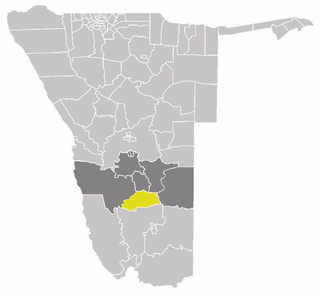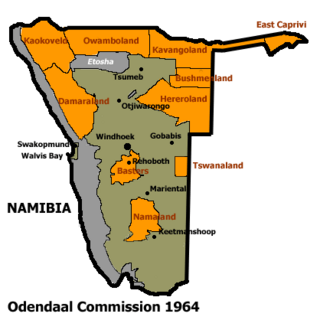The South West Party (in Afrikaans: Suidwes Party, in German: Südwestpartei) was a political party in South West Africa, today Namibia. Initially the party was known as Union Party (Unie Party in Afrikaans). The party was founded in Windhoek in September 1924 by F. van der Heever, A.P. Olivier, and Andries de Wet. [1] It took the name SWP in 1926. [2]

Afrikaans is a West Germanic language spoken in South Africa, Namibia and, to a lesser extent, Botswana and Zimbabwe. It evolved from the Dutch vernacular of South Holland spoken by the mainly Dutch settlers of what is now South Africa, where it gradually began to develop distinguishing characteristics in the course of the 18th century. Hence, it is a daughter language of Dutch, and was previously referred to as "Cape Dutch" or "kitchen Dutch". However, it is also variously described as a creole or as a partially creolised language. The term is ultimately derived from Dutch Afrikaans-Hollands meaning "African Dutch".

German is a West Germanic language that is mainly spoken in Central Europe. It is the most widely spoken and official or co-official language in Germany, Austria, Switzerland, South Tyrol (Italy), the German-speaking Community of Belgium, and Liechtenstein. It is also one of the three official languages of Luxembourg and a co-official language in the Opole Voivodeship in Poland. The languages which are most similar to German are the other members of the West Germanic language branch: Afrikaans, Dutch, English, the Frisian languages, Low German/Low Saxon, Luxembourgish, and Yiddish. There are also strong similarities in vocabulary with Danish, Norwegian and Swedish, although those belong to the North Germanic group. German is the second most widely spoken Germanic language, after English.
A political party is an organized group of people, often with common views, who come together to contest elections and hold power in the government. The party agrees on some proposed policies and programmes, with a view to promoting the collective good or furthering their supporters' interests.
In 1926, the SWP created a pact with the National Party of South West Africa, against the German League in South West Africa (German : Deutscher Bund in Südwestafrika, DBSW). [2] The party contested four seats in the 1926 legislative elections, winning in Gibeon. [3] The following year SWP and the National Party of South West Africa (NPSWA) merged to form the United National South West Party (UNSWP). The UNSWP formed the government of South West Africa from 1926 to 1950. [4]

The National Party of South West Africa was a political party in South West Africa.

Gibeon is a constituency in the Hardap Region of Namibia. In the 2009 presidential election, 3669 people voted. The administrative centre of the constituency is the village of Gibeon.




